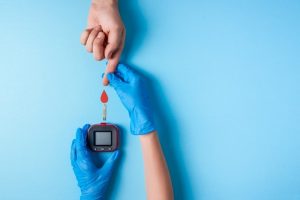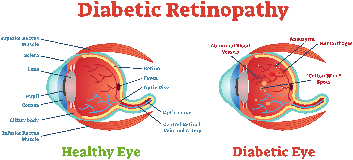Diabetic (Retinopathy) Eye Disease Tuscaloosa

Diabetes affects many areas of the body, from major organs such as the heart and kidneys to blood vessels in the eyes. Diabetic eye disease is a common concern for people with this medical condition and regular eye exams are critical to maintaining good vision and eye health. While diabetes can lead to vision loss, timely diagnosis and regular eye exams can prevent much of the damage.
At the Davis Eye Clinic, our eye doctors specialize in diagnosing and managing eye diseases, including diabetic eye disease. Dr. Thomas M. Davis, Jr., and Dr. James B. Wilhite, Jr., have helped countless patients preserve their eyesight and improve ocular health in Tuscaloosa.
Types of Diabetic Eye Disease
Diabetes can cause several eye problems and increase the risk of other eye diseases, such as cataracts and glaucoma. Uncontrolled diabetes greatly increases the risk of diabetic eye disease, and treatment often starts with better diabetes management. An estimated one in three people living with diabetes will develop diabetic retinopathy after age 40, and this variation is the most common cause of vision impairment in people with the condition.

Diabetic retinopathy damages the retina (the light-sensitive tissue lining the back of the eye). Retinal blood vessels swell, bleed or leak fluid and close off due to high blood sugar. As the disease progresses, new, abnormal blood vessels form on the retinal surface and start to bleed and form scar tissue. Proliferative diabetic retinopathy is the advanced stage that causes central and peripheral (side) vision loss. The longer someone lives with diabetes, the more likely they are to develop diabetic retinopathy, especially with poor management.
Diabetic macular edema is another type of eye damage that can happen in patients with diabetes. Macular edema causes blurred vision and occurs when fluid accumulates on the retina, leading to swelling. The condition may cause permanent vision loss.
People with diabetes are more likely to develop cataracts at an earlier age and are twice as likely to have glaucoma.
Risk Factors for Diabetic Eye Disease
Untreated high blood glucose (sugar) or high blood pressure increases the risk for these diabetic eye diseases. Smoking and high blood cholesterol are additional risk factors. Pregnant women with diabetic retinopathy need careful monitoring because eye problems can progress quickly during pregnancy. Some ethnic groups have a higher likelihood of diabetic eye disease, including African Americans, Hispanics, Pacific Islanders and Alaska Natives. Age is another factor; the longer you have diabetes, the more likely your vision will be affected.
Symptoms of Diabetic Eye Disease
If you have diabetes, proper disease management and regular eye exams are the best ways to prevent vision loss and blindness from diabetic eye disease. Symptoms may include:
- Frequent vision changes
- Dark areas in your field of vision
- Wavy lines
- Blurred vision
- Decreased color perception
- Spots, strings or “floaters”
- Light flashes
Schedule a Comprehensive Eye Exam at Davis Eye Clinic
If you have diabetes, you need regular eye care. Schedule an eye exam with one of our eye doctors in Tuscaloosa, Alabama. Call the Davis Eye Clinic at (205) 556-9400 or fill out our online contact form.

